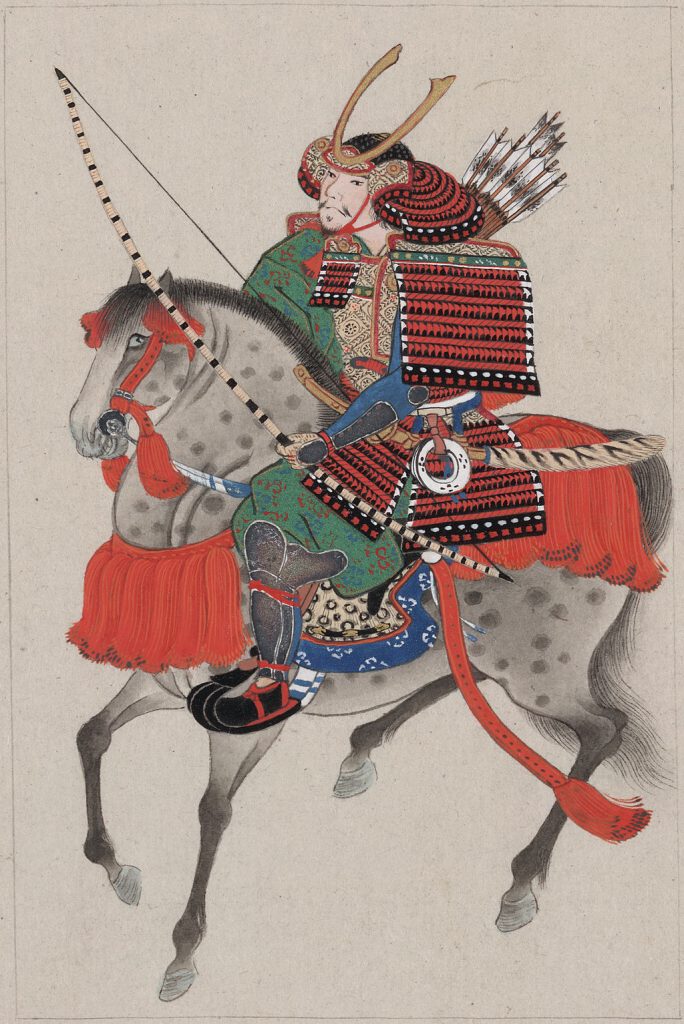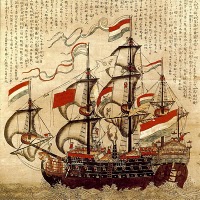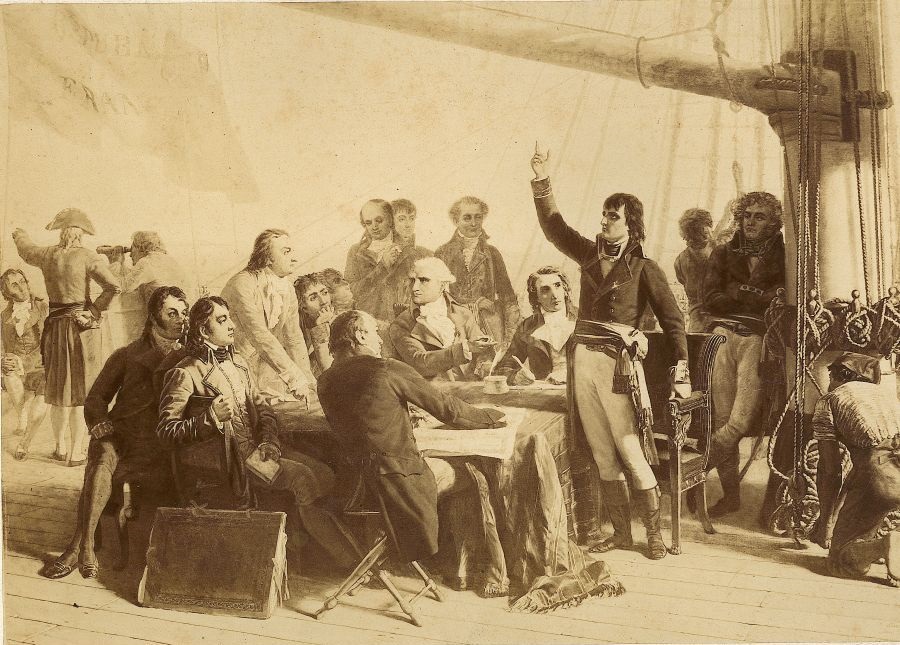
Copyright: Peter [CC BY 2.0 (https://creativecommons.org/licenses/by/2.0)], via Wikimedia Commons
There is a chasm between the agrarian societies of old and the modern industrialized society we live in today. This seems like a trivial statement, surrounded as we are by the byproducts of our industrial civilization, but it may seem less trivial when one considers that many countries in the world today, while enjoying the fruits of industrialization that were invented and in most cases manufactured elsewhere, are not only clinging to the remnants of the old agrarian society paradigms, but actually reverting to them and reinforcing them to a degree that may never have existed in the past. And what is the main paradigm of an agrarian society (as opposed to industrial or subsistence ones)? It is the preeminence of a highly organized religion. This was true around the globe, be it in Europe where the Western (Catholic) and Eastern (Greek Orthodox) churches held sway until the Reformation and in some cases longer than that, in the Muslim countries where Islam ruled supreme, and even in the Far East, where the religious and quasi-religious ideologies of Confucianism, Buddhism, and Shinto ruled.
Organized religion is an appropriate structure for agrarian societies because those societies are inevitably built around a base of peasantry that is engaged in the back-breaking labor of food production, topped by a narrow layer of warrior-class nobility that is served by a separate class of free artisans. Be it in the rice paddies of Japan and China, the barley fields of Russia, or the vineyards on the sunny slopes of Burgundy, peasant lives were brutal and short. Peasants (from paysans, people of the land), were vilified (the word itself comes from the word for “village” as does the word “villain”), oppressed, and used as human shields and canon fodder in endless wars. How could these masses of humanity be persuaded to abide by such horrific fate? By religions that, no matter how disparate, no matter who were their messiahs, founders, or prophets, all promised the same thing: behave according to your station in this life, and you will be rewarded in the next. It doesn’t matter if the punishment for straying from the straight and narrow path in this world was reincarnation as a toad, or an untouchable, or burning forever in the pits of hell, the idea was the same: behave, or else. But that was not all,;organized religions in agrarian societies kept the peasant population in check not only by posthumous sticks and carrots, no, they sanctioned the powers that be to inflict the most horrific punishments on them right here in this world. Russian nobles went to church on Sunday mornings to pray to an all merciful and forgiving Christ and the same afternoon had their peasants flogged to within an inch of their lives and sometimes beyond for the slightest infraction. Many Japanese Daimyo (warlords) and samurai were devout Buddhists who would not hurt a cricket, but they didn’t think twice before slashing open the belly of a peasant who startled their horse.

Copyright: Unknown author [Public domain], via Wikimedia Commons
And there was another control mechanism that could be added to the punishment and reward system in this world and the next, one that didn’t have anything to do with religion. The system worked. Even the lowest peasant could see that. The system made sure the right crops were planted and harvested at the right time, that farmers’ markets were reasonably safe, that enemies and marauders would be capably fought off. The alternative was chaos, starvation, death. The system worked, but the one thing it actively discouraged was technological innovation. The process of discovery, as any big pharma scientist will tell you, is a Darwinian one. It relies on a large and constant stream of ideas, crazy notions generated by free thinkers in the mode of the eccentric English country squire, which are then tried and either discarded or promoted with the help of a system that distributes wealth just enough so that it is not hoarded by a few individuals or institutions and yet does not dilute it so that no one has the funds necessary to try something crazy for the first time. Today, we call these funds “venture capital” and the system of wide, but not excessively wide capital distribution, “capitalism”. But there is a catch: a large contingent of somewhat wealthy independent thinkers is simply incommensurate with the organized state-religions of agrarian societies. There is no room for such people and their out of the box ideas in Catholicism, or Orthodoxy (be it Greek or Jewish) or in fundamentalist Islam.
Societies that saw the flourishing of innovation were always ones that transitioned early on from the agrarian model to the trading model. Whether England or Northern Germany with its Hanseatic League, or the Islamic culture along the Silk Road, trade brought new ideas, made new fortunes, rewarded risk and as a result provided the fuel for technological innovation. Religion fought back, in many cases both brutally and successfully. Spain and Portugal, the first technologically innovative European trading empires since Rome succumbed to pressure from the Catholic church and its hellish spawn the Inquisition to banish the most productive and educated members of their societies: the Jews and the Moors. Spanish and Portuguese Jews, escaping to the Protestant and more tolerant Holland, helped make that tiny country into one the world’s greatest maritime and financial innovators of all time. The French did the same when they slaughtered and expelled the Huguenots, Protestant French from the north Atlantic coast of France, many of whom where excellent seafarers and artisans. Most of them fled to England, where they contributed to that country’s emerging naval and technological prowess. In Florence, the birthplace of Galileo Galilei and Michaelangelo Buonarroti, where for the first time the “banqua” ,the money-lender’s bench, became a bank, the Inquisition mercilessly stifled these seeds of greatness, plunging Italy into the status of a second-rate power to this very day. In the Far East, in China and in Japan, the powers that be simply decided that the technological and ideological innovations they saw coming from the West were not for them and purposefully abolished their navies and closed their ports.

By Suneet – http://suneet-suneet.blogspot.com/2010/12/indian-flag-resemblence-to-dutch-east.html, Public Domain, Link
In a development that most reverberates in the world today, Muslim countries from Indonesia in the East to Morocco in the West decided that if innovation was indeed incommensurate with an organized religion that was the ultimate instrument of state, they would sacrifice it on the altar of tradition. It was simply more important for these countries, for these diverse cultures and ethnicities to remain faithful to their religion as a way of life than to reap the benefits of technological innovation. Some, like the Ottoman empire, tried to enjoy the benefits of technology, particularly in its military manifestations, by importing it from Europe either as finished equipment or hired hands who could assist with local development and manufacturing while being walled off from the rest of society in their foreigner compounds. This model is still followed by many if not most Muslim nations from Saudi Arabia to Indonesia. Of course, as the Ottoman Turks found out when a few French ships of the line under Napoleon conquered Egypt, the technology you buy is always of the second hand kind. The expats you lure into your gated foreigner communities are always the ones that couldn’t make it back home. The same lesson is still being learned every day today by Muslim Arabs trying to win their endless war against Israel. Alas, the lesson learned by the Muslim world from this failure was not that they needed more openness; on the contrary, the consensus was and still is that religious retrenchment to a radical form of Islam that has never been practiced before is the way to go, that the way to win is to wage a war of annihilation against the technologically advanced West (and now also East), no matter the sacrifice in blood or treasure.

Copyright: Bingham, peintre anglais. [Public domain], via Wikimedia Commons
Israel, as has often happened with the Jewish people, is at the forefront of the technology-religion divide. It straddles the fault lines between the highest of hi-tech and the deepest forms of religious intransigence. So far, we may say with caution and without hubris, it is doing so successfully. Many religious and even ultra-orthodox Jews work in Israeli high technology companies. Most Jewish Israelis are what would be described in the West both traditional and religiously inclined, though most are non-observant. But there is also great danger. Technological prowess is not about improving upon what has already been done before, no matter how much the Chinese and the Japanese would wish it to be so. It is about the freedom and the time to think. Think deeply, creatively, even recklessly. People who engage in that kind of thinking are the people that innovate. They are the only ones that do. These are also the kind of people that cherish their freedom to do as they wish more than anything else. They do not enjoy restrictions on their ability to travel when they want, to eat what they want, to educate their children however they want. In Israel, this freedom runs afoul of the desire and indeed necessity to maintain the country as visibly, unmistakably Jewish. Failure to do so would negate all the sacrifice, nullify all the successes of the Zionist movement. It’s a fine balance that no country has so far succeeded in achieving. The West discarded its traditional values and is fast getting buried under the feces of multiculturalism on the streets of San Francisco. The Pacific Rim gave birth to a culture of copycatism and fake consumerism and the Muslim world is spiraling into the black hole of Islamic fundamentalism. And yet the future of humanity depends on the attainment of optimal balance between the innovative and the traditional, the new and the old, the human and the Divine. For the sake of all of us, let’s hope Israel can show us the way.


